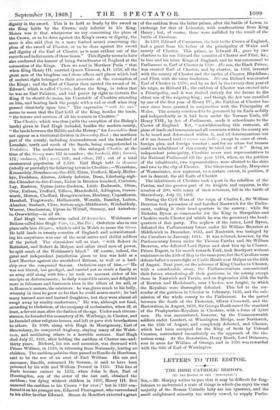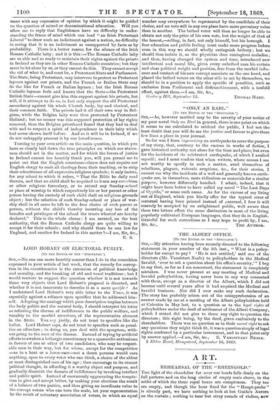LETTERS TO THE EDITOR.
THE IRISH CATHOLIC BISHOPS.
[TO THE EDITOR OF THE " SPECTATOR.")
Sin,—Mr. Murphy writes to you that it may be difficult for Eng- lishmen to understand a state of things in which (he says) the vast majority of the Roman Catholic laity are too ignorant, and the small enlightened minority too utterly cowed, to supply Parlia- ment with any expression of opinion by which it might be guided on the question of mixed or denominational education. Will you allow me to reply that Englishmen have no difficulty in under- standing the frame of mind which can lead " an Irish Protestant Liberal" to draw such an indictment against a nation, no difficulty in seeing that it is an indictment as unsupported by facts as by probability. There is a better reason for the silence of the Irish Roman Catholic laity ; and it is this :—The Roman Catholic laity are as able and as ready to maintain their rights against the priests in Ireland as they are in other Roman Catholic countries; but they must be let alone by us, or they cannot do this. They cannot accept the aid of what is, and must be, a Protestant State and Parliament. The State, being Protestant, may intervene to protect us Protestant laymen against our priests, and the French or Italian State may do the like for French or Italian laymen ; but the Irish Roman Catholic layman feels and knows that the State—the Protestant British State—cannot give him this support against his priests, but will, if it attempt to do so, in fact only support the old Protestant ascendancy against his whole Church body, lay and clerical, and their common faith. The priests had it all their own way in Bel- gium, while the Belgian laity were thus protected by Protestant Holland ; but no sooner was this supposed protection of lay rights removed, than the Belgian priesthood found that they had to deal with and to respect a spirit of independence in their laity which bad never shown itself before. And so it will be in Ireland, if we do not unhappily prevent it by our interference.
Turning to your own article on the main question, in which you have so clearly laid down the true principles on which our states- men should act in the matter, and for which the lovers of justice to Ireland cannot too heartily thank you, will you permit me to point out that the English conscience-clause does not require our English clergy to omit all theology from their teaching, or to strip their schoolrooms of all expressive religious symbols ; it only insists, for any school to which it refers, " That the Bible be daily read therein, and that no child shall be required to learn any catechism or other religious formulary, or to attend any Sunday-school or place of worship to which respectively his or her parent or other person having the custody of such child shall on religious grounds object ; but the selection of such Sunday-school or place of wor- ship shall in all cases be left to the free choice of such parent or person, without the child's thereby incurring any loss of the benefits and privileges of the school the trusts whereof are hereby declared." This is the whole clause : I am assured, on the best authority, that the Roman Catholic clergy are quite willing to accept it for their schools ; and why should there be one law for England, and another for Ireland in this matter ?—I am, Sir, &c., E. S.































 Previous page
Previous page